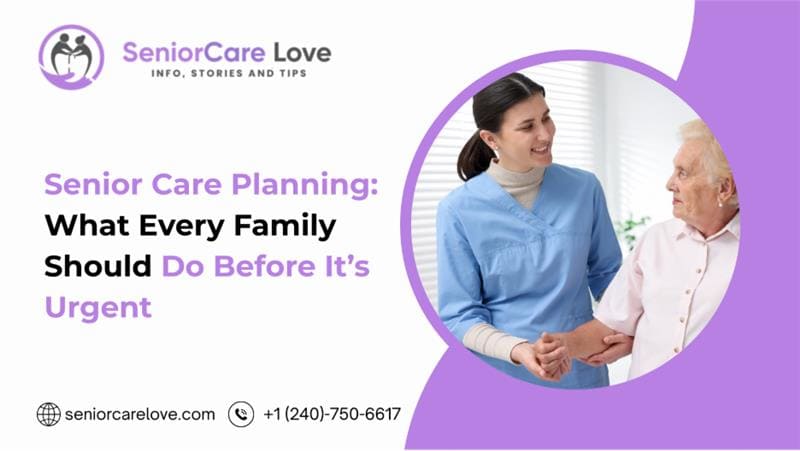Let’s be honest—choosing a senior care advisor feels a little like online dating (minus the catfishing and awkward brunches). You’re putting your trust in someone to help you navigate one of life’s most tender transitions, and the stakes? They’re sky-high.
We’ve worked with families across Maryland and DC for years, and if there’s one thing we’ve learned, it’s this: not all senior care advisors are created equal. Some are absolute angels in khakis. Others? Let’s just say we wouldn’t trust them with our dog’s vet appointments—let alone Mom’s future.
So, if you’re here wondering, “What exactly should I look for in a senior care advisor?”—don’t worry. We’ve got you. Let’s break down the qualities that truly matter (and toss in a few red flags along the way).
1. Deep Local Knowledge (Yes, Knowing Where to Find Good Crab Cakes Counts)
Maryland and DC aren’t just dots on a map. They’re a patchwork of neighborhoods, facilities, providers, and personality quirks (Bethesda’s not Bowie, and don’t let anyone tell you otherwise). Your senior care advisor should not only know the landscape—they should own it.
We once worked with a family relocating their father from Silver Spring to Northern Virginia. Their previous advisor thought “Tysons” was a chicken brand and recommended a community three counties away. Needless to say, it didn’t work out. A seasoned, local-savvy advisor would’ve never made that mistake—and yes, they’d also know which facility chef makes the best crab bisque.
What to look for:
- Familiarity with counties, providers, and traffic patterns (because DC congestion is a beast)
- Strong network of vetted assisted living, memory care, and nursing home options
- On-the-ground insights about community culture, cleanliness, and staff turnover
2. The Listening Gene (It’s Rare, But It Exists)
Some advisors are so eager to place your loved one that they miss the most crucial step: listening. We’re not talking about polite nodding while mentally preparing a sales pitch. We mean the kind of listening that hears what’s not being said.
One daughter told us her mom “liked her privacy.” That’s it. Another advisor heard that and recommended a “cozy shared room with a great roommate.” We heard it and said: “She needs a private suite, possibly with soundproof walls, and God help us if there’s bingo near her door.”
What to look for:
- Advisors who ask questions that go beyond “budget and care level”
- Someone who values emotional context, not just clinical facts
- A clear sign they’re not reading off a one-size-fits-all checklist
3. Honesty That Doesn’t Sugarcoat (But Doesn’t Terrify You Either)
You deserve the truth. Not doomscroll-level bleakness, but not sunshine-and-rainbows fantasy, either. The best advisors balance empathy with honesty—and if they don’t, it’s like hiring a weatherman who only predicts “partly sunny.”
We had a client once who toured a stunning memory care facility in DC. Gorgeous chandeliers, courtyard gardens, jazz brunches every Sunday. The advisor gushed, “It’s perfect for your dad!” Only… Dad was a former jazz musician with severe sundowning who would’ve bolted during brunch and never returned.
Our advice? “Looks great—but let’s find somewhere with tighter security and fewer distractions.” Brutal? Maybe. Honest? Absolutely.
What to look for:
- Transparency about facility strengths and limitations
- Willingness to say, “This might not be the best fit”
- Candor about costs, timelines, and care progression
4. Emotional Intelligence (Or, Can They Handle a Crying Sibling?)
Senior care decisions stir up more emotion than a season finale of This Is Us. One day it’s smooth sailing; the next, there’s a family feud over who gets Mom’s antique soup ladle.
The right advisor knows how to navigate those waves—without judging, without pushing, and without pretending they moonlight as a therapist (though we suspect many do).
What to look for:
- Ability to stay calm during tense family discussions
- Natural empathy and warm communication style
- A knack for diffusing drama with grace (or snacks)
5. Problem-Solving Skills That Border on Magical
We’ve seen advisors pull rabbits out of hats—and we’re not talking about cheesy party tricks. From last-minute respite care arrangements to creative payment solutions, the best advisors think three steps ahead and make the impossible happen.
Case in point: one family was told their dad couldn’t be placed due to a unique combo of dementia and Parkinson’s care needs. The advisor on their case? Found a boutique community that not only specialized in both but also had an open slot that week. Cue the happy tears—and the confused look on Dad’s face when he met the community therapy dog named Elvis.
What to look for:
- Creative thinking, especially around complex care cases
- Resourcefulness with insurance, veterans’ benefits, and Medicaid
- A “never say never” approach (except for sketchy facilities—we always say never there)
6. Professionalism Without the Corporate Stiffness
No one wants to work with someone who sounds like they just emerged from an HR seminar titled “Empathy in the Workplace (Level 1).” Senior care is human work. Personal work. The advisor you choose should feel like part of the team—your team.
That means punctuality, responsiveness, and follow-through—but also a sense of humor, a calming presence, and maybe even a shared hatred of automated phone menus.
What to look for:
- Quick, clear communication (no ghosting, no jargon overload)
- Respect for your time and your emotional bandwidth
- An advisor who feels like an ally, not a gatekeeper
7. Advocacy That Doesn’t End at Placement
Let’s debunk a myth: placement is not the finish line. It’s the beginning. A great senior care advisor sticks around long after the move-in day cupcakes are eaten. They check in. They troubleshoot. They care.
Because things change. Health changes. Staffing changes. Your loved one’s preferences change (ask us about the time a former librarian suddenly refused to live anywhere without poetry readings).
What to look for:
- Continued support post-placement
- Willingness to assist with transitions, emergencies, or “oops, this isn’t working” moments
- A genuine commitment to long-term quality of life
Bonus Red Flags (Because We Can’t Help Ourselves)
Avoid advisors who:
- Get commission-happy with recommendations (ask how they’re paid—it matters)
- Dodge tough questions about staffing, ratios, or incident reports
- Refer to your loved one as a “unit” or “bed fill” (yes, it happens)
- Seem more excited about the facility’s spa than its wound care track record
Final Thought
At Senior Care Love, we’ve seen what happens when families find the advisor—the one who listens, solves, supports, and shows up. It’s not just about securing a room in a building. It’s about peace of mind. It’s about dignity. And occasionally, it’s about making sure Dad gets his 4 p.m. oatmeal cookies delivered warm (we don’t make the rules, we just enforce them).
If you’re starting this journey in Maryland or DC, know that you’re not alone. And you don’t have to figure it all out by yourself. There are advisors who truly care, and when you find the right one, it feels less like a transaction—and more like love. Senior Care Love, to be specific.
FAQs
Q: Do senior care advisors charge a fee?
A: In most cases, no. Reputable advisors are typically paid by the facilities they refer to—but make sure that doesn’t skew their recommendations. Transparency is key.
Q: How long does the placement process usually take?
A: It depends. Emergency placements can happen in 24–72 hours. For non-urgent moves, expect 2–4 weeks on average (with time built in for tours, paperwork, and mental breakdowns—yours, not theirs).
Q: What’s the difference between assisted living and memory care?
A: Assisted living supports day-to-day activities like bathing, meals, and meds. Memory care adds a layer of supervision and structure tailored for individuals with cognitive conditions like Alzheimer’s.
Q: Is it okay to change facilities later?
A: Absolutely. Needs evolve, and what was a great fit in year one may not be by year three. A good advisor will help guide that transition smoothly.
Q: What if we can’t afford private-pay senior care?
A: There are options—Medicaid, VA benefits, long-term care insurance, and even sliding-scale communities. The right advisor knows how to find them.








